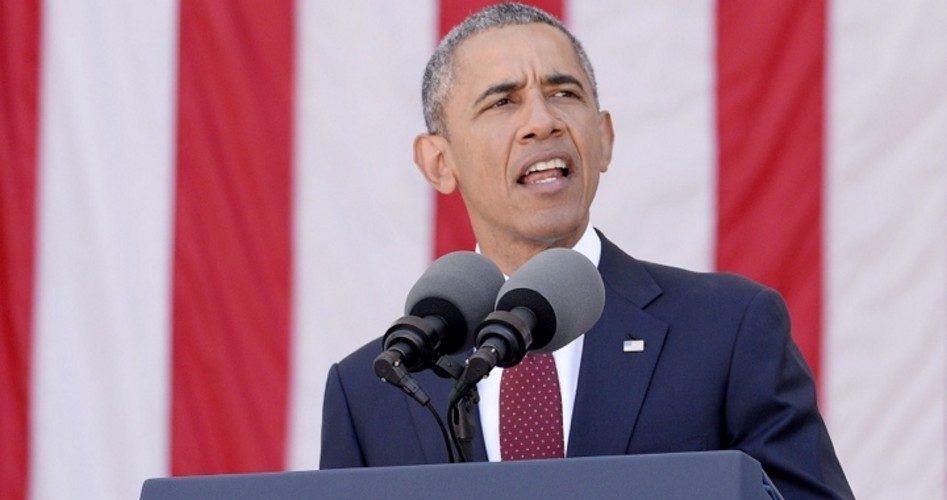
President Obama is surreptitiously using federalism to kill federalism. He will not sit idly by waiting for Congress to act, rather he will actively exert immense influence on state and local governments to carry out his commitment to top-down control of every aspect of human existence.
An article published in USA Today on May 26 highlights the president’s use of the phone portion of his infamous “pen and phone” arsenal to convince local and state governments to bypass congressional inaction by passing ordinances and statutes that implement his policies, obviating the constitutional obstacle of separation of powers.
USA Today considers this strategy revolutionary and there is little to wonder at the apparent architect of this scheme — Valerie Jarrett:
Obama’s state-and-local strategy may be unprecedented in its scope and ambition. Though previous administrations have appointed top advisers to listen to concerns of state and local officials, the Obama White House appears to be the first to aggressively use those same channels to encourage them to adopt Obama’s policies.
“It is a change in the paradigm, where we used to sit passively by waiting for elected officials to come to us. We think we can have a more substantial impact if we collaborate,” said Valerie Jarrett, the assistant to the president for public engagement and intergovernmental affairs.
“I think the president has always had the perspective that change always happens from the ground up, and our state and local officials are oftentimes more influenced by the will of the American people than the politics in Washington would seem to indicate,” Jarrett said in an interview.
The author of the USA Today article does not report whether the ubiquitous (and seemingly omnipotent) Jarrett stepped in the puddle of irony created by that last comment.
It is evidence of President Obama’s hubris to disguise his destructive paternalism behind a benign veil of “ground up” grassroots activism.
His total and unrepentant disregard for constitutional limits of his office permits his espousal and enforcement of acts for which neither he nor Congress has authority. Now, he marries that autocratic mien to a grab for power by proxy to create a totalitarianism that would have made Caligula blush.
In fairness, states and cities could hang up on the president or refuse to act in accordance with his wishes, but any witness would testify that such demonstrations of local and state independence are rarer than a federal official faithful to his oath of office.
Around the country, in fact, Obama and Jarrett have found mayors and state lawmakers willing to make his wish their command. Again, from USA Today:
He’s found fertile ground in Democratic-run cities such as Seattle, where Mayor Ed Murray helped push for a minimum wage and paid leave laws that have gone into effect since April.
“President Obama recognizes that good ideas are being incubated at the local level, and those are ideas that are going to go to scale nationally,” Murray said. That recognition can go a long way in a city such as Seattle, which often doesn’t get the national attention East Coast cities do. “The president of the United States recognizing us only helps us. We do other things beside e-commerce and coffee,” Murray said.
And:
The strategy has been more effective on some policies than others. Since last September, more than 200 mayors have signed on to the My Brother’s Keeper initiative, a commitment to help boys and young men of color. But since Obama called for states to offer free community college in January, only a handful have moved in that direction.
The state-and-local strategy effort has been particularly effective on paid leave policies, which Obama championed in his State of the Union Address this year. “Forty-three million workers have no paid sick leave — 43 million. Think about that,” Obama said. “So I’ll be taking new action to help states adopt paid leave laws of their own.”
That pledge came with a $1 million budget from the Department of Labor to help fund feasibility studies for state and local governments, which will begin to be awarded this summer.
Labor secretary Tom Perez is accompanying Jarrett on a mission to convince local leaders to join the president’s parade of conquered rulers. Perez, USA Today writes, believes Congress will someday act to codify Obama’s policies, but until then “we’re also not going to wait around for Congress to act.”
The familiar “carrot and stick” gambit is the coin of the realm in D.C. From police to highways, from environmental standards to labor policies, the federal government has stomped its heavy jackboot into all aspects of life, areas that were once the bailiwick of states, cities, or the people themselves.
While the opinion of Valerie Jarrett and Barack Obama may be the gospel to progressives and statists, there are others who offered a competing view of the proper constitutional relationship between the states and the federal government.
In Federalist 46, James Madison addressed himself to those “adversaries of the Constitution” that an “uncontrolled” federal authority eventually would swallow up state governments and assume all state prerogatives.
Madison described a symbiotic relationship of state and federal government that would obviate a clash of powers. Madison believed that states would maintain their supremacy over the federal government in terms of their sovereignty principally through the effects of the greater attachment of the “affections” of the people to their state governments than to the distant federal authority.
History, it seems, has not borne out Madison’s confidence in the connections of the people to the state governments.
Madison assumed, however, that the people’s devotion to their state legislatures would compel them to resist any effort by agents of the federal government to subordinate states to second-class status.
The states and the people, Madison argues, would never submit to such despotic designs. The power of this duo — inherent in the latter and artificial in the former — would prevent Patrick Henry’s predicted consolidation of all political power by the federal government.
“What degree of madness,” Madison asks incredulously, “could ever drive the federal government to such an extremity,” to ambitiously encroach on the state governments?
There is almost a dismissive and incredulous tone in Madison’s reassurances of the failsafe and organic potency of state governments. The people, he proposed, would refuse to “cooperate with the officers of the union” attempting to encroach on the prerogatives of the states. He genuinely believed that were the federal government to take such a tyrannical tack, states would combine to block the way, uniting to draw up “plans of resistance.”
Besides, like those well-trained weather watchers that could detect the seed of a hurricane in a surging wave, Madison believed (or at least wrote as if he did) that the American people and the several states would notice the “gathering storm” and prevent the precipitation of unchecked power and invasions on the rights of the people.
Madison, in this matter anyway, has proven less than oracular and we, his descendants, have proven to be useless as predictors of the currents and waves that are about to drown the states, the union, and liberty itself.
Of course, one thing Madison did not foresee was the creation of a central bank granted unlimited authority to print “money” and to make acceptance of that currency mandatory. As casually mentioned in the USA Today article, the federal government can offer billions to governors and mayors to bribe them to willingly reduce themselves to client king status to the potentate on the Potomac.
Unless state and local officials resist the imposition of presidential influence in their jurisdictions, there may soon be no states, counties, or municipalities that function as anything more than administrative subunits of a European-style central government. For this reason, Americans interested in restoring individual liberty should focus first on electing men and women to local and state offices who are steadfastly committed to blocking federal authority at the city limits and state lines.
Photo of President Barack Obama: AP Images



